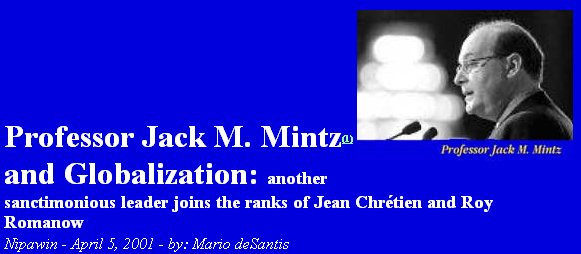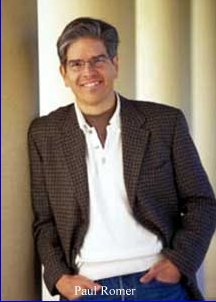Learning Stories
by
Mario deSantis
mariodesantis@hotmail.com
“I am a Canadian, free to speak without fear, free to worship in my own way, free to stand for what I think right, free to oppose what I believe wrong, and free to choose those who shall govern my country.” - -The Rt. Hon. John Diefenbaker, Canadian Bill of Rights, 1960
“The whole judicial system is at issue, it's worth more than one person.”--Serge Kujawa, Saskatchewan Crown Prosecutor, 1991
“The system is not more worth than one person's rights.”--Mario deSantis, 2002
Ensign Stories © Mario deSantis and Ensign
|
|
Professor Jack Mintz has a problem in understanding the social relationships between economics and sovereignty and in his recent speech to a meeting of the Canadian Club(2) has stated that
The problem with Professor Mintz is that he uses the wording "global economy" inappropriately, for the specific purpose to mislead his audience, and in fact, in his speech, he plays with the dichotomy of being global versus being isolationist. But Globalization is not a matter of either being global or isolationist. Globalization, for our contingent economic concerns, rests with the international legal framework which includes the World Trade Organization (WTO), the Institute Monetary Fund (IMF), and the World Bank. I am really not impressed by this sanctimonious professor, and I fear for the brainwashing damage this man is creating to our university students and to our policy makers(3). I realize that our world is the reflection of our individual and collective mental models we have in our heads, but we must distinguish between intelligent mental models and more intelligent mental models. And as I am concerned, Professor Mintz' brain has remained frozen for sometime, maybe ten or eleven years, and this finding transpires when he says that the poor performance of the 90s was due to the political mismanagement of our economic policies in the 70s and 80s. Mintz says
I agree with Canada's mismanagement of the 70s and 80s and I don't agree that in the 90s Canada was faced with two policy options "ruin or retrenchment(4)." Economic growth is not directly related to the degree of taxation of a country, and economic growth is not dependent on the national debt(5).
What happened to Canada is reflected to what happened to its
health care system; Canada and its
Again, and again, and again, business must not be as usual. References/endnotes Relevant political and economics articles http://www.ftlcomm.com/ensign 1. Jack M. Mintz is Professor at the University of Toronto's Rotman School of Management. He is also President and CEO of the C.D. Howe Institute 2. SMART SOVEREIGNTY: CANADIAN PROSPERITY IN AN INTEGRATING WORLD ECONOMY, by Jack M. Mintz, President and CEO C. D. Howe Institute & Arthur Andersen, Professor of Taxation J. L. Rotman School of Management University of Toronto. Prepared for the Canadian Club, April 2, 2001, Royal York Hotel http://www.cdhowe.org/pdf/mintz-6.pdf 3. The assembly line economics is obsolete, by Mario deSantis, December 26, 2000 http://www.ftlcomm.com/ensign/desantisArticles/2000_200/desantis295/supplyNdemand.html 4. THE EQUITY/EFFICIENCY TRADE-OFF IN RETROSPECT, by Lars Osberg, Revised April 26, 1995 http://is.dal.ca/~osberg/publications.html 5. Business must not be as usual, and the "Dalhousie School" of Economics, by Mario deSantis, February 26, 2001 http://www.ftlcomm.com/ensign/desantisArticles/2001_300/desantis334/dalhousie.html 6. Economics of Ideas, Author Kevin Kelly on Paul Romer, http://hotwired.lycos.com/wired_online/4.06/romer/ 7. Why We Don't Have to Choose between Social Justice and Economic Growth: The myth of the equity/efficiency trade-off, Andrew Jackson, Director of Research, Canadian Council on Social Development, Fall 2000 http://www.ccsd.ca/pubs/2000/equity/index.htm |

 Fundamentally,
current economic growth (distinct from social growth) is directly
related to our entrepreneurial abilities to what economist Paul
Romer calls the Economics of Ideas(6). Canada performed worse than
most other developed countries in the 90s, and this was mostly due
to the continuation of the corrupt behaviour of our political and
economic leadership. The dichotomy that Canada was faced with either
"ruin or retrenchment" is a concocted propaganda of our elitist
leadership, who void of ideas but full of greedy consensus,
downsized Canada into the economics for the few and privileged(7).
And what bothers me most is that this same professor Mintz was part
of the greedy leadership which downsized Canada, and now he is
telling us how to protect Canada's sovereignty by joining the
Globalization directed by the WTO, the IMF, and the World Bank.
Fundamentally,
current economic growth (distinct from social growth) is directly
related to our entrepreneurial abilities to what economist Paul
Romer calls the Economics of Ideas(6). Canada performed worse than
most other developed countries in the 90s, and this was mostly due
to the continuation of the corrupt behaviour of our political and
economic leadership. The dichotomy that Canada was faced with either
"ruin or retrenchment" is a concocted propaganda of our elitist
leadership, who void of ideas but full of greedy consensus,
downsized Canada into the economics for the few and privileged(7).
And what bothers me most is that this same professor Mintz was part
of the greedy leadership which downsized Canada, and now he is
telling us how to protect Canada's sovereignty by joining the
Globalization directed by the WTO, the IMF, and the World Bank.  health
care were both downsized by our sanctimonious leadership. And this
same leadership continues to solve our problems today, as Jean
Chrétien heads our government and as his constitutional friend Roy
Romanow heads yet another expensive study in health care. This state
of affairs reminds me of how valuable is the understanding of
Romer's Economics of Ideas, and how perspective Albert Einstein was
when he said that
health
care were both downsized by our sanctimonious leadership. And this
same leadership continues to solve our problems today, as Jean
Chrétien heads our government and as his constitutional friend Roy
Romanow heads yet another expensive study in health care. This state
of affairs reminds me of how valuable is the understanding of
Romer's Economics of Ideas, and how perspective Albert Einstein was
when he said that